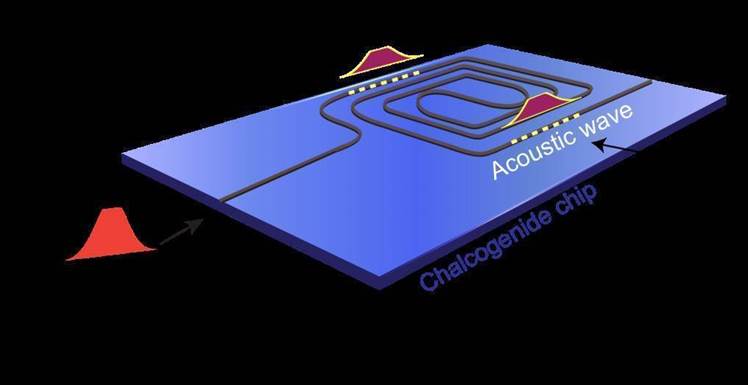University of Sydney scientists have devised a way to store information-carrying light waves as sound, on photonic memory chips, the first time such a transfer has been achieved in the world.

Researchers Dr Birgit Stiller and doctoral candidate Moritz Merklein found a way to transfer information from the optical domain to the acoustic, and back again, allowing data to be stored briefly on photonics chip for processing, retrieval and then further transmission as light waves.
“The information in our chip in acoustic form travels at a velocity five orders of magnitude slower than in the optical domain,” said Dr Stiller, one of the two lead authors of the research which was published in the Nature Communications journal.
Being able to slow down light speed transmitted information is crucial for processing it.
Traditionally, this has been done with electronic microchips, but the researchers point to photonics devices as the better choice for the task.
Using photonics instead of electronics provides not only better performance as the information travels at the speed of light: there is also no risk of interference from electromagnetic radiation.
Photonics chips also don't generate large amounts of heat caused by electronic resistance, the researchers said.
This makes the acoustic buffer ideal for optical telecommunications networks and data centres for cloud computing, the researchers believe.
Merklein and Stiller explained that building an an acoustic buffer inside a chips improves the ability to control information by several orders of magnitude.
The system devised by the researchers can store and retrieve information at multiple wavelengths simultaneously, making it vastly more efficient than previous devices that were limited to narrow bandwidth, they said.
Australian National University's Laser Physics Centre fabricated the chip for coherently transferring information between light and soundwaves.
The work was done at the Australian Research Council Centre of Excellence for Ultrahigh bandwidth Devices for Optical Systems (CUDOS), headquartered at the University of Sydney.


_(20).jpg&h=140&w=231&c=1&s=0)
.png&h=140&w=231&c=1&s=0)
_(33).jpg&h=140&w=231&c=1&s=0)






 iTnews Benchmark Awards 2026
iTnews Benchmark Awards 2026
 iTnews Executive Retreat - Security Leaders Edition
iTnews Executive Retreat - Security Leaders Edition
 iTnews Cloud Covered Breakfast Summit
iTnews Cloud Covered Breakfast Summit
 The 2026 iAwards
The 2026 iAwards












_(1).jpg&h=140&w=231&c=1&s=0)



